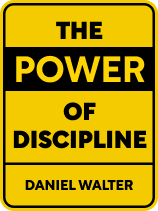

This article is an excerpt from the Shortform book guide to "The Power of Discipline" by Daniel Walter. Shortform has the world's best summaries and analyses of books you should be reading.
Like this article? Sign up for a free trial here.
What is discipline in life? Why does it matter? Why do we often find it a struggle?
Almost everyone has experienced situations where, despite knowing what they should do, they’re compelled by an inner voice to do something easier or more enjoyable. Daniel Walter explains that, if you allow these temptations to dictate your actions, you’ll never reach your full potential.
Continue reading to learn what discipline is and the reasons why we struggle with it.
What Is Discipline in Life?
What is discipline in life? Walter defines it as the ability to make healthy and productive choices, fight against temptations and instant gratification, and ultimately act in your best interests. He notes that having self-discipline is crucial because it pushes you toward actions that breed success—fully committing to your goals, developing good habits, and consistently putting in hard work.
(Shortform note: In Discipline Equals Freedom, Jocko Willink agrees that self-discipline is crucial for committing to goals, developing good habits, working hard, and ultimately becoming successful. However, Willink’s definition of self-discipline is less detailed than Walter’s: He simply defines self-discipline as an internal force that drives you to take action and be better. This arguably misses an important nuance from Walter’s definition: that self-discipline also encapsulates the ability to fight temptations and instant gratification [in other words, the actions that weaken our ability to self-discipline].)
Despite the importance of self-discipline, many people lack this ability because humans have a natural tendency to opt for instant gratification over hard work and long-term rewards—even if hard work is in their best interest. According to Walter, this is problematic because self-discipline doesn’t come naturally to people: It’s a skill that’s developed over time through practice and hard work. So, if you neglect to practice the skill regularly and instead chase instant gratification, you’ll struggle to engage in self-discipline, fail to achieve your goals, and feel unsatisfied in life.
(Shortform note: While experts agree that we naturally lean toward instant gratification, some argue that the solution isn’t practicing self-discipline as Walter recommends. Instead, they suggest learning how to minimize temptations. If we’re able to do this—by either changing ourselves or our environment—we won’t need to use self-discipline. This alternative approach is arguably important to consider because, based on recent research, it might not be possible to teach people lasting self-discipline skills.)
Why Is Discipline Difficult?
Walter explains that humans struggle with self-discipline, and consequently fail to reach their goals, due to four main biological tendencies. We’ll explore each of these tendencies and how to overcome them.
Reason #1
First, Walter explains that we resist change and crave consistency—in our lifestyles, jobs, environments, and so on. This tendency impedes self-discipline because it stops us from taking uncomfortable steps that disrupt consistency but trigger improvement and success.
Here’s an exercise to help you overcome this tendency. When you have an important decision to make, write down your options (for example, make the move or stay in your current location), and list the pros and cons for each. The following day, return to your notes and determine which option will be most advantageous for improving yourself and reaching your goals.
Reason #2
The second tendency that can impact self-discipline is the Dunning-Kruger effect, notes Walter. This effect means that people who have low ability in a skill are more likely to overestimate their ability in that skill. According to this phenomenon, people who are bad at self-discipline are likely to overestimate their ability, and, therefore, neglect practicing it. This is problematic because, as noted, self-discipline is a skill you must regularly practice to be good at it.
To avoid this tendency, Walter recommends seeking feedback from others—especially those that are proficient at the ability you want to work on. This way, you can receive constructive criticism that will help you improve your abilities and avoid the Dunning-Kruger effect.
Reason #3
Walter explains that procrastination weakens our ability to self-discipline because, the more we procrastinate, the more habitual it becomes, and the less likely we are to practice self-discipline. As previously explained, self-discipline is a skill that takes practice to develop. So, when you choose to practice the opposite of self-discipline (procrastination, a type of temptation and instant gratification), you actively weaken your ability to make productive choices (to self-discipline).
To resist the tendency to procrastinate, Walter makes two suggestions. First, get started on a task as soon as possible after deciding to do it—this will ensure that you complete your work on time or even ahead of schedule, allowing for higher-quality results. Second, stop planning and start doing a task when you’re 70% sure you’ll succeed—perfection doesn’t exist, so if you plan until your idea’s perfect, you’ll never get anything done.
Reason #4
Finally, Walter explains that we set unrealistic expectations by underestimating the amount of time and effort it takes to reach our goals. When we neglect to put the necessary time and effort into our endeavors, we’ll likely fail to reach our goals. This failure discourages us from continuing to work toward our goals in the future, crippling our ability to self-discipline.
To overcome this tendency, Walter recommends taking the time to analyze your goals and the actions you’re taking to reach them. Ensure that you’re not engaging in self-sabotaging behaviors that set you up for failure, like setting unrealistic expectations. Ask yourself what a rational time frame to complete your goal is, what work you must do to achieve it, and how often or when you need to do that work to reach your goal within the given time frame. This realistic analysis will reduce your chance of failing and giving up, thus preserving your self-discipline.

———End of Preview———
Like what you just read? Read the rest of the world's best book summary and analysis of Daniel Walter's "The Power of Discipline" at Shortform.
Here's what you'll find in our full The Power of Discipline summary:
- What self-discipline is and why we struggle with it
- How to do what you should do even if it's not what you want to do
- The six good habits that will override your bad habits






